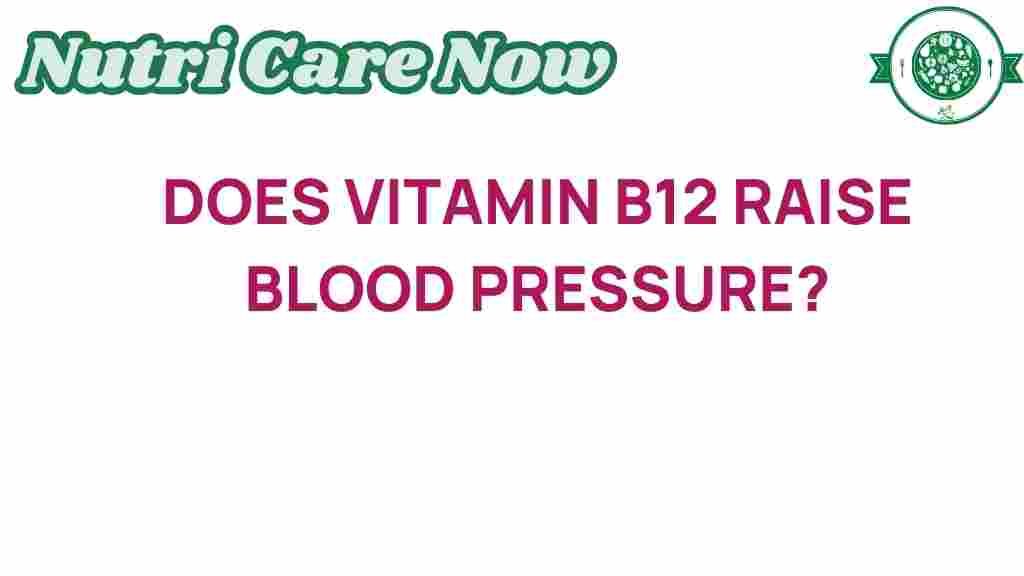Unraveling the Mystery: Does Vitamin B12 Affect Blood Pressure?
Vitamin B12 is a vital nutrient that plays a significant role in maintaining our overall health. It is essential for the production of red blood cells, DNA synthesis, and proper neurological function. Recently, there has been growing interest in understanding how Vitamin B12 might influence blood pressure. Does this crucial vitamin have any impact on our cardiovascular health? In this article, we will delve into the relationship between Vitamin B12, blood pressure, health, nutrition, and the findings from medical research.
Understanding Vitamin B12
Vitamin B12, also known as cobalamin, is a water-soluble vitamin that is primarily found in animal products such as meat, fish, dairy, and eggs. It is crucial for several bodily functions, including:
- Red blood cell formation
- Neurological function
- DNA synthesis
For individuals following a vegetarian or vegan diet, obtaining sufficient Vitamin B12 can be a challenge, which is why supplements may be necessary. Understanding how this vitamin interacts with various bodily systems, including cardiovascular health, is essential for maintaining wellness.
The Link Between Vitamin B12 and Blood Pressure
Research regarding the effects of Vitamin B12 on blood pressure is still ongoing, but some studies suggest that there may be a connection between them. Here, we will explore how Vitamin B12 might influence blood pressure levels.
Medical Research Findings
Several studies have investigated the relationship between Vitamin B12 levels and blood pressure. Some of the key findings include:
- Homocysteine Levels: High levels of homocysteine, an amino acid, have been linked to increased blood pressure and cardiovascular disease. Vitamin B12 helps to lower homocysteine levels, potentially reducing the risk of hypertension.
- Endothelial Function: Vitamin B12 may support endothelial function, which is crucial for blood vessel health. Proper endothelial function helps regulate blood pressure and overall cardiovascular health.
- Inflammation Reduction: Some studies suggest that Vitamin B12 has anti-inflammatory properties, which could contribute to lower blood pressure levels.
However, it’s important to note that while these findings are promising, they do not conclusively prove that Vitamin B12 directly affects blood pressure. More extensive research is needed to draw definitive conclusions.
Dietary Impacts of Vitamin B12
Incorporating Vitamin B12 into your diet can be beneficial for overall health and may indirectly support healthy blood pressure levels. Here are some dietary sources of Vitamin B12:
- Animal Products: Beef, liver, fish, poultry, eggs, and dairy are excellent sources of Vitamin B12.
- Fortified Foods: Many cereals and plant-based milk alternatives are fortified with Vitamin B12, making them suitable for vegans and vegetarians.
- Supplements: Vitamin B12 supplements are available in various forms, including oral tablets, sublingual tablets, and injections.
Including these foods in your diet can help ensure that you meet your Vitamin B12 needs, which is essential for maintaining health and potentially supporting blood pressure management.
Step-by-Step Guide to Managing Blood Pressure with Nutrition
Managing blood pressure through nutrition is a holistic approach that includes considering Vitamin B12 intake. Here’s a step-by-step guide to help you maintain healthy blood pressure levels:
Step 1: Assess Your Current Diet
Take note of the foods you typically consume. Are you getting enough Vitamin B12? If you follow a vegetarian or vegan diet, consider how you will meet your B12 needs.
Step 2: Incorporate Vitamin B12-Rich Foods
Add Vitamin B12-rich foods into your meals. Here are some ideas:
- Breakfast: Fortified cereal with milk and fruit
- Lunch: Tuna salad on whole-grain bread
- Dinner: Grilled chicken with a side of leafy greens
Step 3: Monitor Your Blood Pressure
Regularly check your blood pressure to see how your dietary changes are affecting it. Keeping a record can help you identify trends.
Step 4: Consult with a Healthcare Professional
If you have concerns about your blood pressure or Vitamin B12 levels, consult with a healthcare professional who can provide tailored advice and potentially order blood tests to assess your levels.
Troubleshooting Tips
If you’re struggling to manage your blood pressure or meet your Vitamin B12 needs, consider these troubleshooting tips:
- Evaluate Supplement Options: If dietary sources are insufficient, consider taking a Vitamin B12 supplement. Speak with a healthcare provider to determine the right dosage.
- Focus on Overall Nutrition: Ensure your diet is balanced with adequate fruits, vegetables, whole grains, and healthy fats, as these can also contribute to healthy blood pressure.
- Stay Hydrated: Dehydration can affect blood pressure, so make sure to drink enough water throughout the day.
- Regular Exercise: Incorporate physical activity into your routine, as it is beneficial for blood pressure management.
Conclusion
In conclusion, while there is ongoing research into the effects of Vitamin B12 on blood pressure, it is clear that maintaining adequate levels of this vitamin is important for overall health and wellness. The potential connections between Vitamin B12 and blood pressure, particularly through mechanisms like homocysteine regulation and inflammation reduction, warrant further exploration in medical research.
For those looking to improve their health through nutrition, focusing on Vitamin B12 intake, alongside a balanced diet and healthy lifestyle, can be beneficial. If you’re interested in learning more about nutrition and supplements, consider visiting this resource for additional information.
Ultimately, always consult with a healthcare professional to get personalized advice tailored to your specific health needs. By taking proactive steps in your nutrition and wellness journey, you can support your health and potentially manage your blood pressure more effectively.
This article is in the category Health and created by NutriCareNow Team
